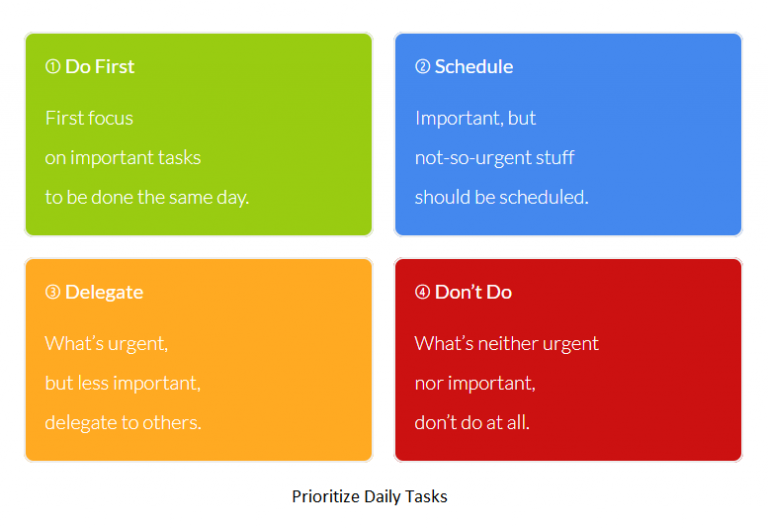Be productive using tools and techniques.

We live in demanding and distracting world.
As we grow in our career we get more knowledge, experience and positions but along with this what comes is more responsibilities and expectations.
Competitive market and fast changing technology demands more and more from us to sustain and provide value.
You may not be able to make the day any longer, but still you will have to find your way of dealing with all these things efficiently.
In such situations it becomes inevitable that we introduce ourselves to some techniques and tools which will help us to fulfil the expectations, so I want to share some things which I used to overcome some of my difficulties.
As a part of management team as I was getting more and more responsibilities, often I found myself stagnant delivering work, fulfilling commitments. Maintaining the momentum was becoming a big challenge. And when you know you are struggling it just adds up in bringing down your energy level. In such situations self-analysis is one of the best medicine which can give you lots of information. When I worked on my self-analysis I found some issues which I was struggling with.
1> Failing to clearly prioritize tasks.
2> Failing to manage time and energy.
Now that I had found the problem I was desperate to find some solutions for it,
it took some time and lots of reading, and finally I found some methods which created an immediate impact on my daily task lists.
Eisenhower matrix
During one of Personal development session held by our CEO I came across this technique which sounded very interesting to me so I went on to study it little more in detail.
Eisenhower's Urgent vs Important principle helped me to think about my priorities and determine which of my activities are important and which are essentially distractions. To Do this, and to minimize the stress of having too many tight deadlines, we need to understand this distinction.
Important: Activities have an outcome that leads to us achieving our goals, whether these are professional or personal.
Urgent Activities: They demand immediate attention and are usually associated with achieving someone else's goals.
They are often the ones we concentrate on and they demand attention because consequences of not dealing with them are immediate.
When we know which activities are important and which are urgent, we can overcome the natural tendency to focus on unimportant urgent activities, so that we can clear enough time to do what's essential for our success reducing stress on us.
How to Use Eisenhower's principle
To Use this principle, list all of the activities and projects you feel you have to do. Try to include everything that takes up your time at work, however unimportant it may be.
Next, think about each activity and put it into one of 4 categories shown in fig.
Use the strategies described below to Schedule your activities.
Important and Urgent
There are 2 Distinct type of “Urgent and important” activities.
One that you could not have foreseen, (e.g client asking estimate for a project, live site issues)
and other is that you have left until the last minute. (e.g Goals planning for next quarter)
If you have lot of “Urgent and important” activities, identify which of these you could have foreseen, and think about how you could schedule similar activities ahead of time so that they don't become urgent.
However you can't always predict or avoid some issues and crises. Here the best approach is to leave some time in your schedule to handle unexpected issues and unplanned emergencies.
Important but not Urgent
These are the activities that help you achieve your personal and professional goals, and complete important work. (e.g Goals planning for next quarter, learning new technology)
Make sure that you have plenty of time to do these things properly, so that they do not become urgent.
Not Important but Urgent
Urgent but not important tasks are things that prevent you from achieving your goals. Ask yourself whether you can reschedule or delegate them. (e.g Hr/Admin related issues, stats report)
A common source of such activities is other people.
Sometimes it's appropriate to say "no" to people politely, or to encourage them to solve the problem themselves.
Not Important and not Urgent
These activities are just a distraction – avoid them if possible. (e.g task creation for project xyz)
You can simply ignore or cancel many of them. However, some may be activities that other people want you to do, even though they don't contribute to your own desired outcomes.
Again, say "no" politely, if you cannot, and explain why you cannot do it.
If people see that you are clear about your objectives and boundaries, they will often avoid asking you to do "not important" activities in the future.
When I started following these techniques it certainly helped me to prioritize and I knew what I need to do but still there were challenges for me to get proper time slots available for me to execute these priorities.
In our organization we work in remotely distributed teams which work in different time zones and our company introduce another tool which helped us to track time and productivity record of individuals.
Hubstaff, This tool tracks your work pattern and activity on your system and provides you statistics like on what task you spent time and how much active you were on it.
Daily statistics, specific project/task wise stats etc.
This tool did help me to identify my work pattern, how I was spending my time, which time of the day my productivity was low or high.
Stats and graphs help me to easily identify timeslots where I should be executing my priority work and when I should be doing low priority work etc. within few days I was able to organize a new work pattern for me and my productivity numbers also started increasing.
Tools & technique can always put you in right direction to improve your performance.

DRUPAL: The CMS you must be looking for!

Culture & happiness in SJI


